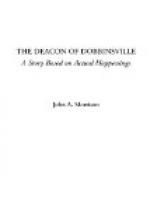“Surely that could not be,” responded the assistant. “Suppose we compare the handwriting on the check that you just cashed with the handwriting on these old papers.” After a close comparison of the two specimens of handwriting, the men decided that their resemblance was not sufficient to prove anything.
“At any rate it will do no harm to investigate,” remarked the cashier as he closed the heavy door of the vault. “I shall turn the evidence over to the insurance company in New York.” That evening at sundown when train Number 29 pulled out from the station at Dobbinsville and sped eastward, it carried in its mailcoach a letter of much significance addressed to the president of a large insurance company in New York City.
The following week one day when the west-bound noon train stopped at Dobbinsville, a well-dressed stranger stepped from the platform of the coach and made inquiry as to the location of a hotel. A lanky-looking lad who leaned against a pole directed the stranger to the Dobbinsville Inn, across the street. A person of this man’s evident rank and importance was not a familiar sight in the streets of Dobbinsville. His mysterious presence set a peaceful town all agog. He became the subject of much exaggerated conjecture. Every fellow was overly eager to tell precisely what he did not know; namely, where this stranger came from and what his business was. Uncle Hezekiah Evans, the sixty-year-old newsboy who peddled the Post around over the village, said this stranger was evidently a rich man from the East who had come to buy the whole town out. “Fatty” Jones, whose chief employment was that of sitting on a baggage truck at the depot, had the opinion that this stranger was the son of a St. Louis millionaire who, having much time and money, had come out to an up-to-date country to spend both. It was the candid opinion of old “Doc” Greenwich that this stranger had committed a crime somewhere and was lounging around in this secluded nook to evade the officers of the law. “Dad” Brunt, the honored proprietor of the Dobbinsville Inn, had an advantage over his fellows, as the stranger was staying with him. He was sure that this man was interested in timberlands in the Mount Olivet neighborhood, as he had known the man to make two trips out here during his stay at the Inn.
The stranger spent a week in Dobbinsville, during which time he made frequent calls at the People’s State Bank. When he had gone, the cashier, to the great relief and surprise of his fellow townsmen, explained to them that he was an officer of the law whose business was to investigate the circumstances connected with the burning of Deacon Gramps’ barn.
Just about one month from this time Uncle Hezekiah Evans did a flourishing business selling papers. The Post came out with this startling headline: “Deacon hears own funeral preached.” Great excitement prevailed. Everybody in Dobbinsville who could read and some who could not bought a paper from Uncle Hezekiah. He sold all he had, and wished for more to sell. Not only were the people of Dobbinsville interested in this remarkable newspaper headline, but in every town and city that fell within the limits of the Post’s rather metropolitan circulation, people were startled at the unusual thought of a man hearing his own funeral. The article in the Post read like this:




